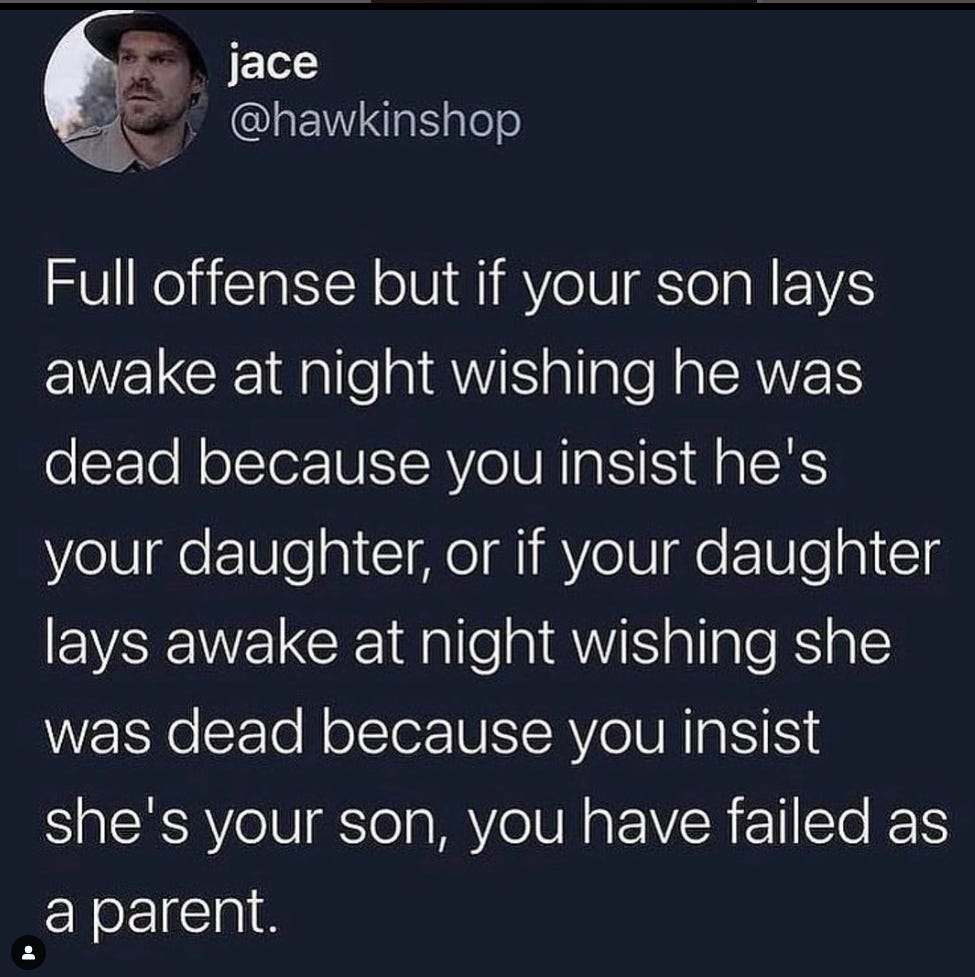Trans 101: Part 6
Part 6 of 11: What Transitioning Looks Like for Trans Kids Without Parental Support
(Links to Parts 1, 2, 3, 4, and 5)
Hey friends - we’re over halfway done so I wanted to take a second to thank you for chipping away at these posts; I’m so grateful for your commitment to educating yourselves about the transitioning process. You are lovely :)
Today’s post is a hard one, where we move on to the more heart-breaking and difficult part: how does social and medical transitioning happen for a child whose parents/guardians won’t support them?
In short, a child can only attempt to orchestrate social transitioning on their own until they reach age 16. This transition might look like asking their teachers and classmates to refer to them by a different name and appropriate pronouns and they may try altering their style of dress and behaviour to match their gender identity more closely.
I’m going to suggest that this would require a tremendous amount of courage on behalf of a child, and that if they’re willing to take this step it indicates a deep and genuine sense of knowing who they are, or at the very least, being driven enough to try to discover who they truly are.
If a child has received the message at home that their gender identity - or the exploration of it - is unwelcome and unacceptable, they are living with an additional layer of shame and confusion, which would (in my opinion) most likely cause them to hide this identity that is apparently “wrong” and try to conform to their parents’/guardians’ wishes.
If they reach a point where they are desperate enough to risk bullying & harassment from their peers and being outed to their parents in order to gain some peace of mind by at least being called by a name and pronouns that fit them, research has shown that it’s imperative for the well-being of that child/adolescent for others to honour their request (more info on that in the next section).
Why is social transitioning - not medical transitioning - a child or adolescent’s only option until they reach the age of 16?
It’s like this: in Canada, the age of majority for making medical decisions is 18 years of age. This just means that anyone aged 18 and up doesn’t need parental/guardian consent to make medical decisions for themselves.
However, under the Advanced Health Care Directives Act, people 16 years of age or older are presumed to be competent to make health care decisions, while people younger than 16 are not (although these presumptions can be rebutted with evidence to the contrary). This means that - if a medical doctor deems a 16-year-old able to understand relevant information and reasonably foresee consequences - the doctor can prescribe treatment without parental consent.
With this in mind, then, once a trans child reaches age 16, they would technically be able to get a GP referral to Klinic in Winnipeg in order to begin the transitioning process without parental/guardian consent (although Klinic does prefer to have parental/guardian consent in addition to the referral from a GP).
I’ll let you read the details of the process on the Klinic website, but very generally, the process would go like this (for adults and teens aged 16 and up):
Registration (would require referral from a GP)
Intake appointment with a Social Worker (part of their job is to identify red flags and concerns about the readiness - particularly of a teen - for transitioning, and to ensure the person has solid support as they move forward, whether that be continuing to meet with the social worker regularly, connecting them to other trans folks, etc.)
Intake appointment with a nurse/medical practitioner for bloodwork and to fill out consent forms
Medical Care visit with a medical practitioner (hormones are typically prescribed at this appointment)
Follow-Up Care (consisting of several appointments including mandatory lab work and optional social work or peer support),
Transfer of care back to the teen’s primary care provider once transitioning goals are met.
A word about transitioning for adults and teens aged 16 & up:
The actual transitioning process and timeline is different for everyone: some people are content to only transition socially (even as adults), others are satisfied with social transitioning and hormone therapy, others feel more at home with themselves after social transitioning, hormone therapy, and top surgery, while others prefer all of the above plus bottom surgery (which again, only happens after age 18). There are other transitioning supports that can be explored as well (most of which can only be accessed after age 18), such as voice training, laser hair removal, tracheal shaving, facial feminization surgery, etc.
There is no “one size fits all” approach, and transitioning truly is a highly individualized process that unfolds over the course of many years (even a lifetime), although the medical portion can go fairly quickly from age 18 and up in order to alleviate mental and emotional distress for the person.
Unfortunately, until age 16, a trans teen without supportive parents or guardians has very few options in the transitioning process.
Let me end this section by saying that gender-affirming health care is supported by every major medical, psychological, and psychiatric association in North America; numerous peer-reviewed research studies corroborate this, and it’s incredibly important that we don’t allow our uninformed fears or politicians to dictate the parameters of gender-affirming health care. It’s essential that experts in this field continue to shape guidelines and policies around the data they continue to gather, and that we don’t allow trans healthcare to become politicized.
(There’s a fantastic short video from WeAreAllies.ca that they posted to Instagram on July 31st, 2024, where Dr. Ted Jablonski talks about how tragic it is that trans youth have been targeted by political gain. Knowledgeable medical practitioners know that trans care is simply not a problem, and have no concerns about the safety and efficacy of their therapies and treatments, and are using them wisely, following specific protocols. I can’t seem to link here, so if you have a minute, head to their account on Insta and please check it out. Also: WeAreAllies.ca is a great website for additional information.)
See you in the next post when we look at 4 common questions/concerns re: the transitioning process.
~ K.



